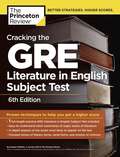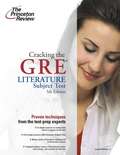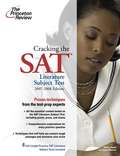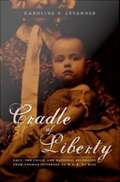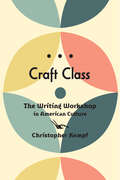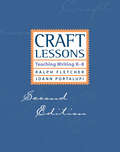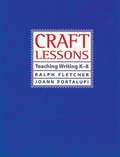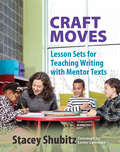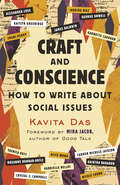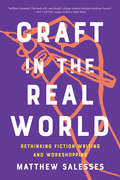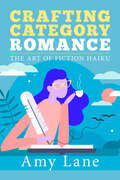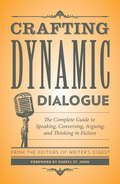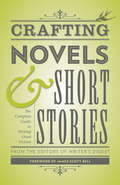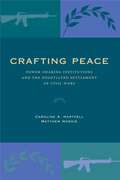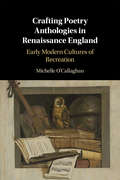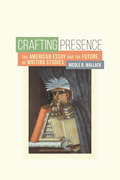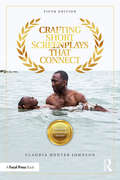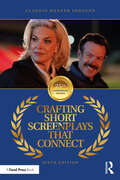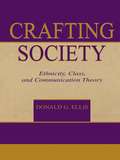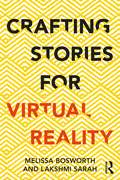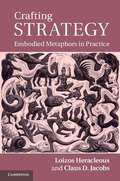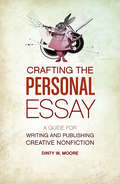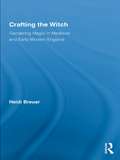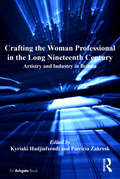- Table View
- List View
Cracking the GRE Literature in English Subject Test
by Douglas McmullenThe GRE Literature in English Subject Test is a supplementary test to the GRE General Test. This book helps to perfect your pacing and familiarize yourself with the test format includes a full-length practice GRE Literature Subject Test.
Cracking the GRE Literature in English Subject Test, 2005 Edition
by Douglas McmullenThe GRE subject tests are among the most difficult standardized exams. Rather than testing general problem-solving skills, they require highly specialized knowledge. The experts at The Princeton Review have thoroughly research each subject test to provide students with the most thorough, up-to-date information available. Students don't need to relearn the entire histories of their fields--just what they need to know to earn high scores on the exams. Each guide includes one full-length practice exam, complete with comprehensive explanations for every solution.
Cracking the SAT Literature Subject Test, 2007-2008 Edition
by Princeton ReviewThe Princeton Review realizes that acing the SAT Literature Subject Test is very different from earning straight A's in school. We don't try to teach you everything there is to know about literature--only the techniques and information you'll need to maximize your score. In Cracking the SAT Literature Subject Test, we'll teach you how to think like the test writers and: Learn what subject matter will be tested so you can study more effectively; Review key terms, types of literature, and reading-comprehension concepts that will help you decipher complicated questions; Use proven techniques to raise your score. The 2007-2008 edition of Cracking the SAT Literature Subject Test is revised and updated to include the most current information possible.
Cradle of Liberty: Race, the Child, and National Belonging from Thomas Jefferson to W. E. B. Du Bois
by Caroline F. LevanderThroughout American literature, the figure of the child is often represented in opposition to the adult. In Cradle of Liberty Caroline F. Levander proposes that this opposition is crucial to American political thought and the literary cultures that surround and help produce it. Levander argues that from the late eighteenth century through the early twentieth, American literary and political texts did more than include child subjects: they depended on them to represent, naturalize, and, at times, attempt to reconfigure the ground rules of U. S. national belonging. She demonstrates how, as the modern nation-state and the modern concept of the child (as someone fundamentally different from the adult) emerged in tandem from the late eighteenth century forward, the child and the nation-state became intertwined. The child came to represent nationalism, nation-building, and the intrinsic connection between nationalism and race that was instrumental in creating a culture of white supremacy in the United States. Reading texts by John Adams, Thomas Paine, Harriet Beecher Stowe, Augusta J. Evans, Mark Twain, Pauline Hopkins, William James, Jos Mart, W. E. B. Du Bois, and others, Levander traces the child as it figures in writing about several defining events for the United States. Among these are the Revolutionary War, the U. S. -Mexican War, the Civil War, and the U. S. expulsion of Spain from the Caribbean and Cuba. She charts how the child crystallized the concept of self--a self who could affiliate with the nation--in the early national period, and then follows the child through the rise of a school of American psychology and the period of imperialism. Demonstrating that textual representations of the child have been a potent force in shaping public opinion about race, slavery, exceptionalism, and imperialism, Cradle of Liberty shows how a powerful racial logic pervades structures of liberal democracy in the United States.
Craft Class: The Writing Workshop in American Culture
by Christopher KempfThe hidden history of the creative writing workshop and the socioeconomic consequences of the craft labor metaphor.In a letter dated September 1, 1912, drama professor George Pierce Baker recommended the term "workshop" for an experimental course in playwriting he had been planning with former students at Harvard and Radcliffe. This was the first time that term, now ubiquitous, was used in the context of creative writing pedagogy. Today, the MFA (master of fine arts) industry is a booming one, with more than 200 programs and thousands of residencies and conferences for aspiring writers nationwide. Almost all of these offerings operate on the workshop model.In Craft Class, Christopher Kempf argues that the primary institutional form of creative writing studies, the workshop, has remained invisible before our scholarly eyes. While Baker and others marshaled craft toward economic critique, craft pedagogies consolidated the authority of elite educational institutions as the MFA industry grew. Transcoding professional-managerial soft skills—linguistic facility, social and emotional discernment, symbolic fluency—in the language of manual labor, the workshop nostalgically invokes practices that the university itself has rendered obsolete. The workshop poem or short story thus shares discursive space with the craft IPA or hand-loomed Pottery Barn rug—a space in which one economic practice rewrites itself in the language of another, just as right-wing corporatism continuously rewrites itself in the language of populism.Delineating an arc that extends from Boston's fin de siècle Society of Arts and Crafts through 1930s proletarian workshops to the pedagogies of Black Mountain College and the postwar MFA, Craft Class reveals how present-day creative writing restructures transhistorical questions of labor, education, and aesthetic and economic production. With the rise of the workshop in American culture, Kempf shows, manual and mental labor have been welded together like steel plates. What fissures does that weld seal shut? And on whose behalf does the poet punch in?
Craft Lessons: Teaching Writing K-8
by Ralph Fletcher JoAnn PortalupiSince its publication in 1998 Craft Lessons has become a staple in the writing classroom of both new and experienced teachers. Authors Ralph Fletcher and JoAnn Portalupi recognized the need for a succinct resource and teamed together to write the second edition of Craft Lessons: Teaching Writing K-8 . Teachers pressed for time will appreciate the practical lessons and instructional language geared to three grade level groupings: K-2, 3-4, and 5-8. This edition includes: 17 brand new lessons; mini lessons designed from teachers&’ comments about what is observed students&’ writing Revisions to other craft lessons and the resource materials sections have been expanded New ways to approach teaching using elements of craft and the reading-writing connection A subject index to find specific craft lessons with ease The authors&’ thoughts about how craft lessons fit into their newest thinking about the qualities of writing: Ideas, Design, Language, and Presentation The 95 lessons in this book provide a wealth of information for teaching leads, character, endings, stronger verbs, and much more. This new edition reestablishes Craft Lessons as the crucial desert island book for harried writing teachers everywhere
Craft Lessons: Teaching Writing K-8
by Ralph Fletcher Joann PortalupiCraft is the cauldron in which the writing gets forged. Ralph Fletcher and JoAnn Portalupi argue that too often we concentrate on the beginning and ending of the writing process--conceiving and correcting--while leaving students on their own to make a thousand critical decisions in their writing about crafting leads, voice, structure, supporting detail, setting, mood, and character. What elements of craft can we teach student writers, and at what age are they ready to learn them? This book answers both questions. Craft Lessons is the practical text for the over-scheduled writing teacher who wants to give students fresh challenges for their writing but doesn't have time to pore over dozens of trade books to do so. There are three main sections in the book: one geared for teachers of primary students, one for teachers of grades 3-4, and one for teachers of middle school writers. This developmental structure allows teachers to go directly to those craft lessons most applicable and adaptable to their own students. Each of the 78 lessons is presented on a single page in an easy-to-read format.
Craft Moves: Lesson Sets for Teaching Writing with Mentor Texts
by Stacey ShubitzHow do you choose mentor texts for your students? How do you mine them for the craft lessons you want your students to learn?In Craft Moves: Lesson Sets for Teaching Writing with Mentor Texts , Stacey Shubitz, co-founder of the Two Writing Teachers website, usestwenty recently published picture books to createmore than 180 lessons to teach various craft moves that will help your students become better writers.Each of the 184 lessons in the book includes a publisher's summary, a rationale or explanation of the craft move demonstrated in the book, and a procedure that takes teachers and students back into the mentor text to deepen their understanding of the selected craft move. A step-by-step guide demonstrates how to analyze a picture book for multiple craft moves.Shubitzintroduces picture books as teaching tools and offers ways to integrate them into your curriculum and classroom discussions. She then shares different routines and classroom procedures designed to help students focus on their writing during the writer's workshop as well as focusing how teachers can prepare for small group instruction.Using picture books as mentor texts will help your students not only read as writers and write with joy but also become writers who can effectively communicate meaning, structure their writing, write with detail, and give their writing their own unique voice.
Craft and Conscience: How to Write About Social Issues
by Kavita DasThe first major book for writers to more effectively engage with complex socio-political issues—a critical first step in creating social changeWriters are witnesses and scribes to society's conscience but writing about social issues in the twenty-first century requires a new, sharper toolkit. Craft and Conscience helps writers weave together their narrative craft, analytical and research skills, and their conscience to create prose which makes us feel the individual and collective impact of crucial issues of our time. Kavita Das guides writers to take on nuanced perspectives and embrace intentionality through a social justice lens. She challenges writers to unpack their motivations for writing about an issue and to understand that &“writing, irrespective of genre or outlet, is an act of political writing,&” regardless of intention. The book includes essays from a fascinating mix of authors, including James Baldwin, Alexander Chee, Kaitlyn Greenidge, George Orwell, Roxanne Dunbar-Ortiz, Gaiutra Bahadur, Jaquira Díaz, and Imani Perry. By including Das&’s own perspective and those of the featured writers about motivations and approaches to writing about fraught social issues, this book both demystifies the process of engaging social issues on the page, and underscores the intentionality and sensitivity that must go into the work.
Craft in the Real World: Rethinking Fiction Writing and Workshopping
by Matthew SalessesThis national bestseller is "a significant contribution to discussions of the art of fiction and a necessary challenge to received views about whose stories are told, how they are told and for whom they are intended" (Laila Lalami, The New York Times Book Review).The traditional writing workshop was established with white male writers in mind; what we call craft is informed by their cultural values. In this bold and original examination of elements of writing—including plot, character, conflict, structure, and believability—and aspects of workshop—including the silenced writer and the imagined reader—Matthew Salesses asks questions to invigorate these familiar concepts. He upends Western notions of how a story must progress. How can we rethink craft, and the teaching of it, to better reach writers with diverse backgrounds? How can we invite diverse storytelling traditions into literary spaces? Drawing from examples including One Thousand and One Nights, Curious George, Ursula K. Le Guin's A Wizard of Earthsea, and the Asian American classic No-No Boy, Salesses asks us to reimagine craft and the workshop. In the pages of exercises included here, teachers will find suggestions for building syllabi, grading, and introducing new methods to the classroom; students will find revision and editing guidance, as well as a new lens for reading their work. Salesses shows that we need to interrogate the lack of diversity at the core of published fiction: how we teach and write it. After all, as he reminds us, "When we write fiction, we write the world."
Crafting Category Romance - The Art of Fiction Haiku: The Art Of Fiction Haiku
by Amy LaneCategory romance is a precise art. With such a small word count, writing the perfect category romance is a little like writing a haiku. But how do you write a book in seventeen syllables? How can you cram compelling conflict, satisfying character development, and toe-curling romantic tension into less than sixty thousand words? In Crafting Category Romance, two-time RITA™-nominated author of nearly one hundred books Amy Lane describes the rules of engagement, traps to watch out for, and how to leverage common tropes to create conflict, craft a character, develop a plot, and leave readers with a happy ever after that's different every time—all in a tidy package. With practical exercises in plot, conflict, and character development, Crafting Category Romance will teach you how to use the rigid rules and expectations of the genre to your advantage and win a loyal readership following for life.
Crafting Dynamic Dialogue: The Complete Guide to Speaking, Conversing, Arguing, and Thinking in Fiction (Creative Writing Essentials)
by Cheryl St. John Writer's Digest EditorsWrite authentic dialogue that invigorates your story! Exceptional dialogue isn't just important when writing fiction--it's essential. In order to impress an agent or editor and keep readers turning pages, you need to deliver truly standout dialogue in every scene. Crafting Dynamic Dialogue will give you the techniques and examples you need to impress your readers. This book is a comprehensive guide to writing compelling dialogue that rings true. Each section is packed with advice and instruction from best-selling authors and instructors like Nancy Kress, Elizabeth Sims, Steven James, Deborah Halverson, James Scott Bell, Donald Maass, Cheryl St. John, and many others. They'll show you how to:Bend the rules to create a specific effectUnderstand the role of dialogue in reader engagementUse dialect and jargon effectivelyGive every character a believable, unique voiceSet the pace and toneReveal specific character background detailsGenerate tension and suspenseUtilize internal dialogueWhether you're writing flash fiction, a short story, or a novel-length manuscript, Crafting Dynamic Dialogue will help you develop, write, and refine dialogue to keep your readers hooked.
Crafting Novels & Short Stories: The Complete Guide to Writing Great Fiction (Creative Writing Essentials)
by Editors of Writer's DigestLearn How to Create Stories That Captivate Agents, Editors, and Readers Alike! Inside you'll find the tools you need to build strong characters, keep your plots moving, master the art of dialogue, choose the right point of view, and more. This comprehensive book on the art of novel and short story writing is packed with advice and instruction from best-selling authors and writing experts like Nancy Kress, Elizabeth Sims, Hallie Ephron, N.M. Kelby, Heather Sellers, and Donald Maass, plus a foreword by James Scott Bell. You'll learn invaluable skills for mastering every area of the craft: Define and refine your characters. Make your plot and conflict high-energy and intense. Hone your story's point of view. Create a rich setting and backstory. Craft dialogue that rings true. Select the right words and descriptions throughout your story. Revise your story to perfection. Throughout you'll find supplemental sections that cover special topics like getting started, beating writer's block, researching your work, and getting published. They'll help you integrate your skills into a balanced, productive, and fulfilling career. Whether you're writing flash fiction, a short story, a novel, or an epic trilogy, you'll come away with the tools you need for strong and effective storytelling.
Crafting Peace: Power-Sharing Institutions and the Negotiated Settlement of Civil Wars
by Caroline A. Hartzell Matthew HoddieThe recent efforts to reach a settlement of the enduring and tragic conflict in Darfur demonstrate how important it is to understand what factors contribute most to the success of such efforts. In this book, Caroline Hartzell and Matthew Hoddie review data from all negotiated civil war settlements between 1945 and 1999 in order to identify these factors.What they find is that settlements are more likely to produce an enduring peace if they involve construction of a diversity of power-sharing and power-dividing arrangements between former adversaries. The strongest negotiated settlements prove to be those in which former rivals agree to share or divide state power across its economic, military, political, and territorial dimensions.This finding is a significant addition to the existing literature, which tends to focus more on the role that third parties play in mediating and enforcing agreements. Beyond the quantitative analyses, the authors include a chapter comparing contrasting cases of successful and unsuccessful settlements in the Philippines and Angola, respectively.
Crafting Poetry Anthologies in Renaissance England: Early Modern Cultures of Recreation
by Michelle O'CallaghanThe printed poetry anthologies first produced in sixteenth-century England have long been understood as instrumental in shaping the history of English poetry. This book offers a fresh approach to this history by turning attention to the recreative properties of these books, both in the sense of making again, of crafting and recrafting, and of poetry as a pleasurable pastime. The model of materiality employed extends from books-as-artefacts to their embodiedness - their crafted, performative, and expressive capacities. Publishers invariably advertised the recreational uses of anthologies, locating these books in early modern performance cultures in which poetry was read, silently and in company, sometimes set to music, and re-crafted into other forms. Engaging with studies of material cultures, including work on craft, households, and soundscapes, Crafting Poetry Anthologies argues for a domestic Renaissance in which anthologies travelled across social classes, shaping recreational cultures that incorporated men and women in literary culture.
Crafting Presence: The American Essay and the Future of Writing Studies
by Nicole B. WallackEssays are central to students’ and teachers’ development as thinkers in their fields. In Crafting Presence, Nicole B. Wallack develops an approach to teaching writing with the literary essay that holds promise for writing students, as well as for achieving a sense of common purpose currently lacking among professionals in composition, creative writing, and literature. Wallack analyzes examples drawn primarily from volumes of The Best American Essays to illuminate the most important quality of the essay as a literary form: the writer’s “presence.” She demonstrates how accounting for presence provides a flexible and rigorous heuristic for reading the contexts, formal elements, and purposes of essays. Such readings can help students learn writing principles, practices, and skills for crafting myriad presences rather than a single voice. Crafting Presence holds serious implications for writing pedagogy by providing new methods to help teachers and students become more insightful and confident readers and writers of essays. At a time when liberal arts education faces significant challenges, this important contribution to literary studies, composition, and creative writing shows how an essay-centered curriculum empowers students to show up in the world as public thinkers who must shape the “knowledge economy” of the twenty-first century.
Crafting Short Screenplays That Connect
by Claudia Hunter JohnsonCrafting Short Screenplays That Connect, Fifth Edition, stands alone among screenwriting books by emphasizing that human connection, though often overlooked, is as essential to writing effective screenplays as conflict. This ground-breaking book will show you how to advance and deepen your screenwriting skills, increasing your ability to write richer, more resonant short screenplays that will connect with your audience. Award-winning writer and director Claudia Hunter Johnson teaches you the all-important basics of dramatic technique and guides you through the challenging craft of writing short screenplays with carefully focused exercises of increasing length and complexity. In completing these exercises and applying Johnson’s techniques and insights to your own work, you will learn how to think more deeply about the screenwriter’s purpose, craft effective patterns of human change, and strengthen your storytelling skills. This 20th Anniversary Edition features 11 short screenplays, including Academy Award winning Barry Jenkins' (Moonlight, If Beale Street Could Talk) luminous short film, My Josephine, and an accompanying companion website that features the completed films and additional screenplay examples. The book has also been expanded and updated to include two new award-winning screenplays Killer Kart and The Great Wall of Vicky Lynn. and a brand-new chapter exploring the use of genre in the short film. An absolute must-have resource for students of screenwriting.
Crafting Short Screenplays That Connect
by Claudia Hunter JohnsonCrafting Short Screenplays That Connect, Sixth Edition, stands alone among screenwriting books by emphasizing that human connection, though often overlooked, is as essential to writing effective screenplays as conflict.Award-winning writer and director Claudia Hunter Johnson teaches you the all-important basics of dramatic technique and guides you through the challenging craft of writing short screenplays with carefully focused exercises of increasing length and complexity. In completing these exercises and applying Johnson’s techniques and insights to your own work, you will learn how to think more deeply about the screenwriter’s purpose, craft effective patterns of human change, and strengthen your storytelling skills. This 25th Anniversary Edition features 11 short screenplays, including Academy Award winning Barry Jenkins’ (Moonlight, If Beale Street Could Talk) luminous short film, My Josephine (now in the Criterion Collection), and an accompanying companion website that features the completed films and additional screenplay examples. The book has also been updated and expanded to include more excerpts from leading films and TV series as well as collaboration exercises and invaluable guidance about giving and receiving effective feedback.This ground-breaking book will show you how to advance and deepen your screenwriting skills, increasing your ability to write richer, more resonant short screenplays that will connect with your audience. It remains an absolute must have resource for students of screenwriting.
Crafting Society: Ethnicity, Class, and Communication Theory (Routledge Communication Series)
by Donald G. EllisThe study of communication, language, and discourse is at once simple, elegant, and complex. Each of these areas is informed by "micro" subjective experiences of individuals and the "macro" processes of a culture. Communication itself is thoroughly modern yet it seeks anchorage in the traditions of the humanities and social sciences. All of this creates a significant challenge. In this monograph, Ellis considers the study of communication as he discusses three key issues in communication theory: (1) the growing emphasis on meaning, (2) the importance of a mediated culture, and (3) the links between micro communication activities and macro social categories such as ethnicity and social class. In response to these three issues, this book deals with the way people use language and communication to construct their world; this world is not constructed purely but is influenced by attitudes, ideologies, and biases. In the modern world the medium of communication has an impact on consciousness and society, and Ellis shows how the media are responsible for some of the fault lines in society. The book also explores principles of medium theory and documents the impact of media on psychological and sociological phenomena. Finally, work of Goffman, Giddens, and Randall Collins is extended to show how micro communication behaviors are implicated in and by social conditions. ADDITIONAL COPY FOR MAILER Expanded features: * The chapters work out a logic connecting real communication patterns with the broad principles upon which societies are explored. Thus the title "Crafting" Society--the crafting is purposefully active to indicate the dynamic processes involved in creating what we call society. Society and culture have their roots and empirical bases in communication; that is, in the daily struggles of interaction. * Two chapters on two of the most important and controversial issues of the day--ethnicity and class. These two chapters are clear illustrations of the new theoretical principles discussed throughout the book. * A chapter on social class is very unique for a book devoted to communication processes. Communication theorists do not usually write about class, even though it is a highly symbolic process and rooted in communication patterns. Class is a difficult concept in America since so few people, other than sociologists, care to talk about it. * A chapter on medium theory takes the bold step of experimenting a little by summarizing basic causal statements and propositions. This device underscores the goal of a theory which is to come to grips with testable statements. The focus is on medium theory and how the media influence consciousness and social structure. * A unique chapter takes up the issue of how communication processes are constitutive of social structures. It draws on work by Giddens and others to return to a concept of structure based on actions that produce and reproduce structure.
Crafting Stories for Virtual Reality
by Melissa Bosworth Lakshmi SarahWe are witnessing a revolution in storytelling. Publications all over the world are increasingly using immersive storytelling—virtual reality, augmented reality and mixed reality—to tell compelling stories. The aim of this book is to distill the lessons learned thus far into a useful guide for reporters, filmmakers and writers interested in telling stories in this emerging medium. Examining ground-breaking work across industries, this text explains, in practical terms, how storytellers can create their own powerful immersive experiences as new media and platforms emerge.
Crafting Strategy: Embodied Metaphors in Practice
by Loizos Heracleous Claus D. JacobsThe rationalist approach to strategizing emphasizes analytical and convergent thinking. Without denying the importance of this approach, this book argues that strategists must learn to complement it with a more creative approach to strategizing that emphasizes synthetic and divergent ways of thinking. The theoretical underpinnings of this approach include embodied realism, interpretivism, practice theory, theory of play, design thinking, as well as discursive approaches such as metaphorical analysis, narrative analysis, dialogical analysis and hermeneutics. The book includes in-depth discussions of these theories and shows how they can be put into practice by presenting detailed analyses of embodied metaphors built by groups of agents with step-by-step explanations of how this process can be implemented and facilitated. The link between theory and practice is further supported by the inclusion of several vignettes that describe how this approach has been successfully employed in a number of organizations, including BASF and UNICEF.
Crafting The Personal Essay: A Guide for Writing and Publishing Creative Non-Fiction
by Dinty W. MooreAward winning essayist Scott Russell Sanders once compared the art of essay writing to "the pursuit of mental rabbits"#151;a rambling through thickets of thought in search of some brief glimmer of fuzzy truth. While some people persist in the belief that essays are stuffy and antiquated, the truth is that the personal essay is an ever-changing creative medium that provides an ideal vehicle for satisfying the human urge to document truths as we experience them and share them with others#151;to capture a bit of life on paper. Crafting the Personal Essayis designed to help you explore the flexibility and power of the personal essay in your own writing. This hands-on, creativity-expanding guide will help you infuse your nonfiction with honesty, personality, and energy. You'll discover: An exploration of the basics of essay writing Ways to step back and scrutinize your experiences in order to separate out what may be fresh, powerful, surprising or fascinating to a reader How to move past private "journaling" and write for an audience How to write eight different types of essays including memoir, travel, humor, and nature essays among others Instruction for revision and strategies for getting published Brimming with helpful examples, exercises, and sample essays, this indispensable guide will help your personal essays transcend the merely private to become powerfully universal.
Crafting the Witch: Gendering Magic in Medieval and Early Modern England (Studies in Medieval History and Culture)
by Heidi BreuerThis book analyzes the gendered transformation of magical figures occurring in Arthurian romance in England from the twelfth to the sixteenth centuries. In the earlier texts, magic is predominantly a masculine pursuit, garnering its user prestige and power, but in the later texts, magic becomes a primarily feminine activity, one that marks its user as wicked and heretical. This project explores both the literary and the social motivations for this transformation, seeking an answer to the question, 'why did the witch become wicked?' Heidi Breuer traverses both the medieval and early modern periods and considers the way in which the representation of literary witches interacted with the culture at large, ultimately arguing that a series of economic crises in the fourteenth century created a labour shortage met by women. As women moved into the previously male-dominated economy, literary backlash came in the form of the witch, and social backlash followed soon after in the form of Renaissance witch-hunting. The witch figure serves a similar function in modern American culture because late-industrial capitalism challenges gender conventions in similar ways as the economic crises of the medieval period.
Crafting the Woman Professional in the Long Nineteenth Century: Artistry and Industry in Britain
by Kyriaki Hadjiafxendi Patricia ZakreskiOver the course of the nineteenth century, women in Britain participated in diverse and prolific forms of artistic labour. As they created objects and commodities that blurred the boundaries between domestic and fine art production, they crafted subjectivities for themselves as creative workers. By bringing together work by scholars of literature, painting, music, craft and the plastic arts, this collection argues that the constructed and contested nature of the female artistic professional was a notable aspect of debates about aesthetic value and the impact of industrial technologies. All the essays in this volume set up a productive inter-art dialogue that complicates conventional binary divisions such as amateur and professional, public and private, artistry and industry in order to provide a more nuanced understanding of the relationship between gender, artistic labour and creativity in the period. Ultimately, how women faced the pragmatics of their own creative labour as they pursued vocations, trades and professions in the literary marketplace and related art-industries reveals the different ideological positions surrounding the transition of women from industrious amateurism to professional artistry.
Crafty TV Writing: Thinking Inside the Box
by Alex EpsteinA professional TV writer's real-world guide to getting paid to write great television"No need for me to ever write a book on TV writing. Alex Epstein has covered it all . . . along with a few things I wouldn't have thought of. Save yourself five years of rookie mistakes. Crafty TV Writing and talent are pretty much all you'll need to make it."—Ken Levine, writer/producer, MASH, Cheers, Frasier, The Simpsons, Wings, BeckerEveryone watches television, and everyone has an opinion on what makes good TV. But, as Alex Epstein shows in this invaluable guide, writing for television is a highly specific craft that requires knowledge, skill, and more than a few insider's tricks.Epstein, a veteran TV writer and show creator himself, provides essential knowledge about the entire process of television writing, both for beginners and for professionals who want to go to the next level. Crafty TV Writing explains how to decode the hidden structure of a TV series. It describes the best ways to generate a hook, write an episode, create characters the audience will never tire of, construct entertaining dialogue, and use humor. It shows how to navigate the tough but rewarding television industry, from writing your first "spec" script, to getting hired to work on a show, to surviving—even thriving—if you get fired. And it illuminates how television writers think about the shows they're writing, whether they're working in comedy, drama, or "reality."Fresh, funny, and informed, Crafty TV Writing is the essential guide to writing for and flourishing in the world of television.
